Description
The metamorphosis is a short novel by Franz Kafka, first published in 1915. In this story, Kafka subtly changes the behavior of human beings in the position of weakness and strength.
The story is about a young boy named Gregor (Gregoire) who lives with his father, mother and sister named Garrett. Due to his father’s old age, Gregor is the breadwinner of the family and works in a business, and for his work, he has to travel to different cities by train.
One morning when Gregor wakes up, he realizes that he has turned into a big beetle; He has to get on the train early in the morning for work, he is shocked by what happened and his efforts to overcome the new situation are in vain. Because Gregor is accustomed to locking himself in his room at night, his father warns him from behind the door that it is too late; Eventually Gregor fails to do anything, and an hour later, someone from the business (his workplace) follows him.
The family, who think Gregor is ill, all come to the back of his room with the man and ask him to open the door; Gregory opens the door after much struggle, and everyone is terrified of seeing him; The mother faints, the man who came from the business runs away, and the father walks him into his room like an animal, waving a cane in the air.
From that day on, Gregor (Garrett)’s sister is in charge of feeding his brother, leaving him with vegetables and cleaning his brother’s room. Two months pass in the same way, and every time Gregor leaves the room, he leads to fear and loss of consciousness of his mother and harsh treatment of his father. Since Gregory was the sole breadwinner of the house; Gregor’s transformation transforms the family’s economic situation into a situation in which all members of the family are forced to work;
Thus, the mother sews cloth for a clothing store, the father works in a financial firm, and the sister is hired as a saleswoman somewhere. As Garrett gets employed, he becomes more busy and no longer has time to reach Gregor as before, bringing him food carelessly and in a hurry.
The father then rents a room to three men to support himself, and they sometimes have lunch or dinner with Gregor’s family members. On one of these nights after dinner, Garrett plays the violin for the tenants and his parents. Seeing her, everything falls apart, the sister stops playing, the tenants get upset and angry, and the father leads them to their room;
Referring to Gregor, the sister then says to her father: “I do not want to attribute my brother’s name to this creature. We have done everything we can for him so far. In addition, we work all day, we can no longer bear this constant torment at home. ; “We have to get rid of him!” After hearing these words, Gregor returned to his room sadly and with difficulty and died that night. The next morning, the family learns of Gregor’s death;
The father evicts the tenants in the first move. Then the father, mother and sister think that their suffering is over and so they decide to spend the day to rest. So they go to the suburbs and have fun and talk about the future; A future without Gregorian metamorphosis looks even more promising.
In the story of Franz Kafka, Gregor’s transformation from a human to a nasty creature like a beetle may seem a bit exaggerated and even ridiculous. However, as we continue the story and the actions of the characters and their emotions become more apparent, we realize that Kafka’s purpose in doing so; It is the drawing and examination of human poverty, when changes in a person’s environment and circumstances can change concepts such as fairness and love.
Kafka shows that it is essentially the Gregorian family that has the lowest human and moral values. Gregor has changed physically, but Kafka clearly shows that his basic and inner identity has not changed in any way.
He still has human feelings and needs, he still likes to communicate with his family and other members of society, and he still wants to fulfill his responsibilities. Gregor’s father, mother, and sister do not change in appearance, but the metamorphosis is deeper. Because they show how easily one person’s beliefs, values, and attitudes toward him or her may change as a result of a psychological disorder.
From the very beginning of the story, Gregor is introduced as a complete and complex character. Like many people, he hates his job, but he knows he needs it to support his family. He claims that he is very interested in his arduous job and being a traveling salesman. She continues her career, not only because she supports her family and pays off her parents’ debts, but also because she hopes that with the help of this job she will be able to send her sister Garrett to a conservatory, thus helping her sister. Can learn to play the violin professionally. At the very beginning of the story, instead of understanding the depth of Gregor’s character, we become acquainted with an analysis of his character. Through these conversations, we discover Gregor’s thinking and kindness.
In a short time, however, it becomes clear that Gregor’s family does not have his consideration and kindness. In fact, after the transfiguration, they completely lose their fairness and love for him. Gregor wakes up one morning and realizes that he has turned into a beetle. Like any other human being, he is initially shocked and amazed. However, after a while he accepts these new conditions, in principle he has to accept these unchangeable conditions.
There is nothing he can do to change the situation. All it can do is adapt its attitudes and moods to these changes. But his family members do not seem to have the ability to make such a compromise.
Symbolically, Gregor’s transformation into a beetle reflects his view of his failed character. He can not find a way to leave his job and defend his needs and identity, his loyalty and commitment to his family prevents him from doing so. The Gregor family’s judgment of him is even more severe and distorting. At first they try to accept him, Gregor’s strange appearance influences the attitude of family members towards him.
They act irrationally, showing no fairness or compassion for the situation. They reach a point where they can no longer communicate with the new Gregor, while only his appearance has changed. They look at him in a hateful and unkind way. Gregor is the only member of the family who is only ostensibly out of humanity. While the mother, father, and Garrett are internally out of the human state, the latter is more intense and deeper.
Meskhafka is an exaggerated symbolic story that deals with many themes. The most important of these is the destruction of justice and compassion, even by those who are not expected to do so. The transformation that Gregor is undergoing is truly appalling. The inability of family members to adapt to the changes shows the complete collapse of the foundation of this family. This story speaks in a warning way about the delicacy and fragility of concepts such as fairness and compassion.
Book Review
Loneliness is one of the greatest human pains. Pain that, if it penetrates a person’s being, leads him to emptiness. When a person loses the support of those around him and becomes alienated from others, he will gradually become alienated from himself. This alienation from separation from outer space is described in Kafka’s novel Metamorphosis as an Insect.
About Franz Kafka, one of the greats of twentieth century German literature
Franz Kafka was born in Prague in 1883 to a Jewish family. His father was a Jewish businessman who created a frightening atmosphere at home due to his authoritarian and violent behavior. Kafka’s father’s mistreatment was very influential in his upbringing, and throughout his life he could not remove the shadow of hatred from his life. Kafka was fluent in German, Czech and French, and studied chemistry for two weeks at Charles University in Prague before switching to law. The length of his law degree allowed Kafka to attend German literature and art classes. At university, he met Max Broad and Felix Welch, two of Kafka’s closest friends for the rest of his life.
Kafka received his doctorate in law from Charles Ferdinand University in 1906 and has since worked for several insurance companies. His promotions in the workplace showed that he was very busy, while his goal was to make a living and pay for his living expenses. He was full of genius and perseverance, so much so that he was able to invent the first helmet, and he was awarded the Medal of Honor for his invention that reduced the casualties of workers. Kafka began writing private notes in 1910 that reflected his fears.
His resentment of his family was evident in his works. Kafka then traveled to Berlin to focus more on writing. He suffered from depression throughout his life and suffered from various mental and physical problems. Finally, Kafka contracted tuberculosis and died in Vienna in 1924 and was buried in the Prague Jewish Cemetery.
Kafka’s works
During Kafka’s lifetime, his works were ignored, and he advised his friend Max Brod to burn all his works after his death. But Broud, against Kafka’s request, published works by him that were in his possession. Kafka’s most important works are the short stories of metamorphosis and the novels The Trial and The Palace. He wrote his works in German.
About the translator of the book The metamorphosis
Sadegh Hedayat was born in February 2012 in Tehran. He spent his high school years first at the Academy of Arts and later at the French School. At the same time, he published his first article in a weekly newspaper. Hedayat became a vegetarian during this period and published two books, “Man and Animal” and “Benefits of Vegetarianism”. In 1305, he went to Belgium, where he began his studies in pure mathematics, but soon after, due to dissatisfaction with the conditions of study in Belgium, he went to Paris. In 1307, he had an unsuccessful suicide, which is said to be due to emotional issues, and at that time he wrote the plays “Parvin Dokhtar Sasan”, “Zande Be Gore” and the short story “Madeleine”.
He returned to Tehran in 1309 and after that Hedayat began to write his books seriously and many research and fiction works were published by him. At that time, Sadegh Hedayat became one of the first banned pens in the history of Iranian censorship for his work “Mustabab and Ghogh Sahab” in collaboration with “Massoud Farzad”. In 1315, he traveled to India and published the book “The Blind Owl”. In 1316, he returned to Iran and wrote works such as “Stray Dog”, the long story of “Hajia Agha” and literary criticism articles and translations of works by “Kafka”. In 1329 he went to France and in April 1330 he committed suicide in his private house in Paris.
In a part of the book we read The metamorphosis
For the first fifteen days, the parents could not bring themselves to see him, and he was often praised for his sister’s perseverance; If in the past they were upset with her and considered her a useless girl. Now it often happened that the parents at the back of the nest room waited for their daughter to clean the room and, when leaving, carefully narrate what the room was like, what the nun had eaten, and what she had done this time; In addition, he was asked if he had recovered.
As soon as he entered the room, the door closed and the key turned twice. Its sound was so loud and sudden that it folded its legs. It was his sister who was in such a hurry; Because he had gotten up at the first moment to be ready, and at the right time he had jumped so fast towards the door that you could not even hear his footsteps. “Oh, finally …” he said to his parents as he turned the key in the lock. Guar Samsa looked around in the dark and asked, “Okay, now?” He soon realized that he could not be surprised;
Because he was more surprised that he had been able to move on such thin legs. In addition, it gave him a kind of relative comfort. He felt pain in his body; But it seemed that these pains had subsided and would eventually go away completely. He suffered almost no pain from the rotten apple that had sunk into his back, nor from the swelling around him, which was covered with soft dust. With sad compassion, he thought of his family again. He should have known he had gone, and if that were possible he would have been more firm in his opinion than his sister.
Related books The metamorphosis
1- Introducing the book The metamorphosis on YouTube
2- Introducing the book The metamorphosis in Aparat



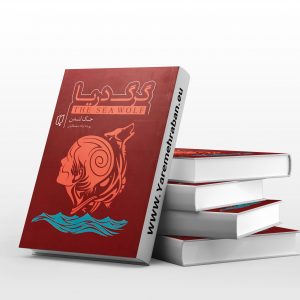
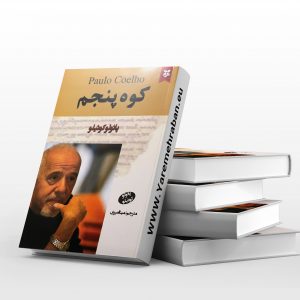
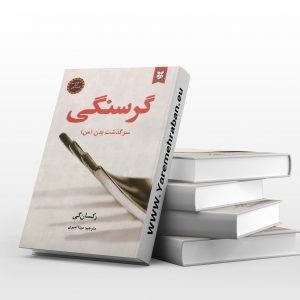

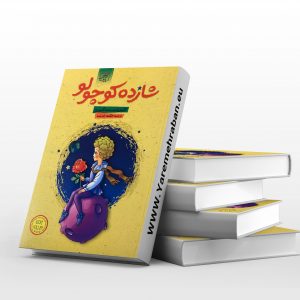
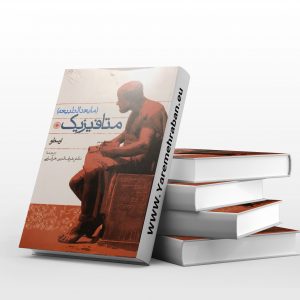





Reviews
There are no reviews yet.